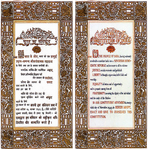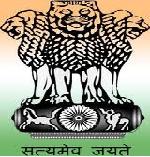The preamble to the Indian Constitution is a brief introductory statement that sets out the guiding purpose and principles of the Constitution of India. The Preamble of the Constitution reads as follows:
 WE, THE PEOPLE OF INDIA, having solemnly resolved to constitute India into a SOVEREIGN SOCIALIST SECULAR DEMOCRATIC REPUBLIC and to secure to all its citizens:
WE, THE PEOPLE OF INDIA, having solemnly resolved to constitute India into a SOVEREIGN SOCIALIST SECULAR DEMOCRATIC REPUBLIC and to secure to all its citizens:
JUSTICE, social, economic and political;
LIBERTY of thought, expression, belief, faith and worship;
EQUALITY of status and of opportunity; and to promote among them all
FRATERNITY assuring the dignity of the individual and the unity and integrity of the Nation;
IN OUR CONSTITUENT ASSEMBLY this twenty-sixth day of November, 1949, do HEREBY ADOPT, ENACT AND GIVE TO OURSELVES THIS CONSTITUTION.
Meaning of the Preamble to the Constitution of India
 The enacting words “We, the people of India… in our constituent assembly… do here by adopt, enact and give to ourselves this constitution”, signifies the democratic principle that power is ultimately vested in the hands of the people of the country. It also emphasizes on the fact that the constitution is made by and for the people of India and not given to them by any power outside the country.
The enacting words “We, the people of India… in our constituent assembly… do here by adopt, enact and give to ourselves this constitution”, signifies the democratic principle that power is ultimately vested in the hands of the people of the country. It also emphasizes on the fact that the constitution is made by and for the people of India and not given to them by any power outside the country.
Sovereign
The word sovereign means independent. India is internally and externally sovereign – internally, it has a government elected directly by the people and externally, it is free from the control of any foreign power.
Socialist
The word socialist implies that the government has control over the economy. The government will endeavor to equally distribute the wealth and provide a decent standard of living for all the citizens. As a socialist country, our country emphasizes on a commitment towards the formation of a welfare state.
Secular
The word secular implies equality of all religions and religious tolerance in the country. Every person has the right to preach, practice and propagate any religion he/she chooses. The government should not favour or discriminate against any religion in the country. All citizens are equal in the eyes of law irrespective of their religious beliefs.
Democratic
India is a democratic country. The people of India can elect their governments at all levels local, state or central. Irrespective of the caste, creed, colour, sex, religion or education, every Indian above 18 years can cast their vote to elect their leader.
Our democratic system gives chance for every competent person to join Parliament. It states that no person is greater than the ruling system. Our Democratic system emphasizes on a multi-party system, unlike China and North Korea etc., which are single-party states.
Republic
Republic nature of the country is opposite to monarchy. In monarchy, the head of state is appointed on hereditary basis for a lifetime. But a democratic republic is an entity in which the head of state is elected, directly or indirectly by the people for a fixed tenure.
Moreover, there are some countries which are republic but not democratic such as China and Myanmar. There are some countries which are democratic but not republic such as UK, Australia, The Kingdom of Sweden etc.
You may also like to read:
A Tribute to Republic of India
